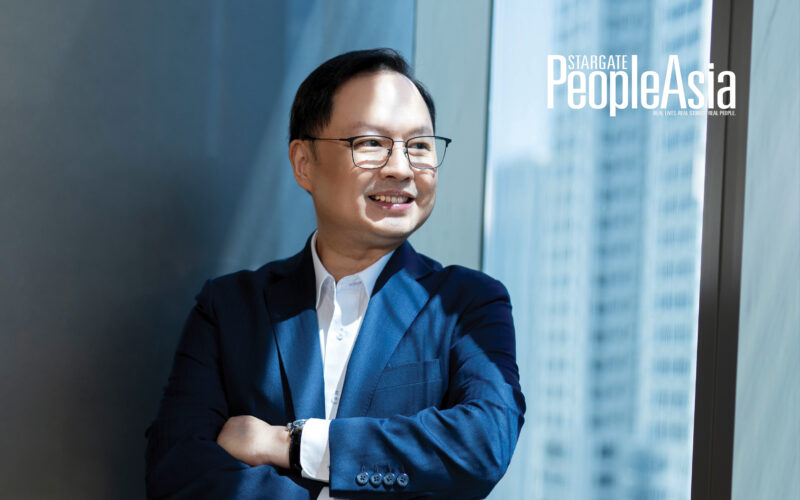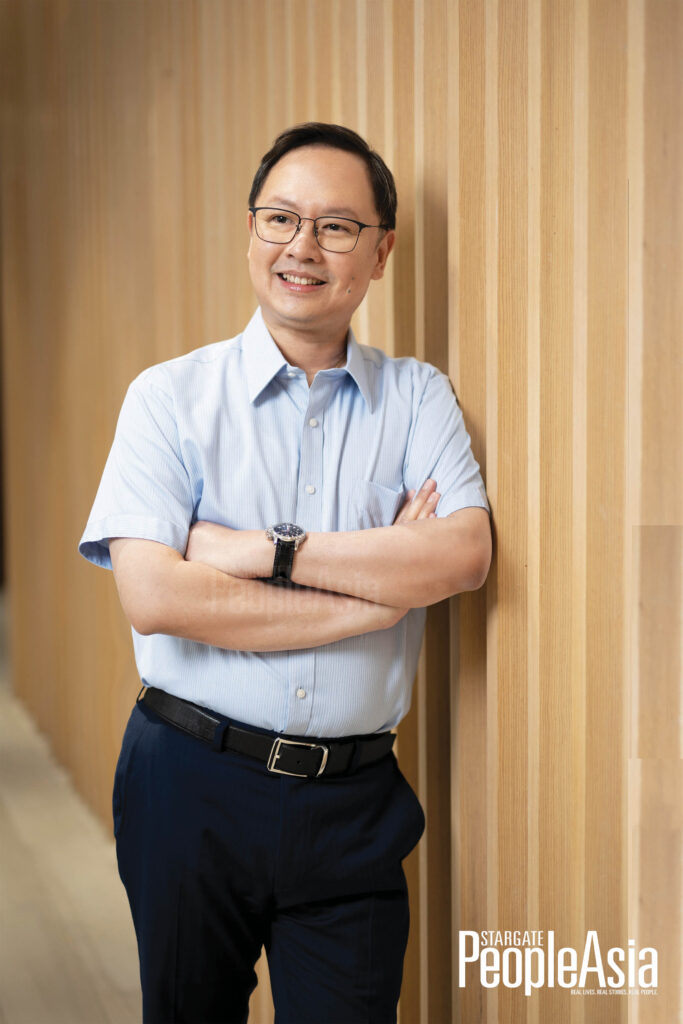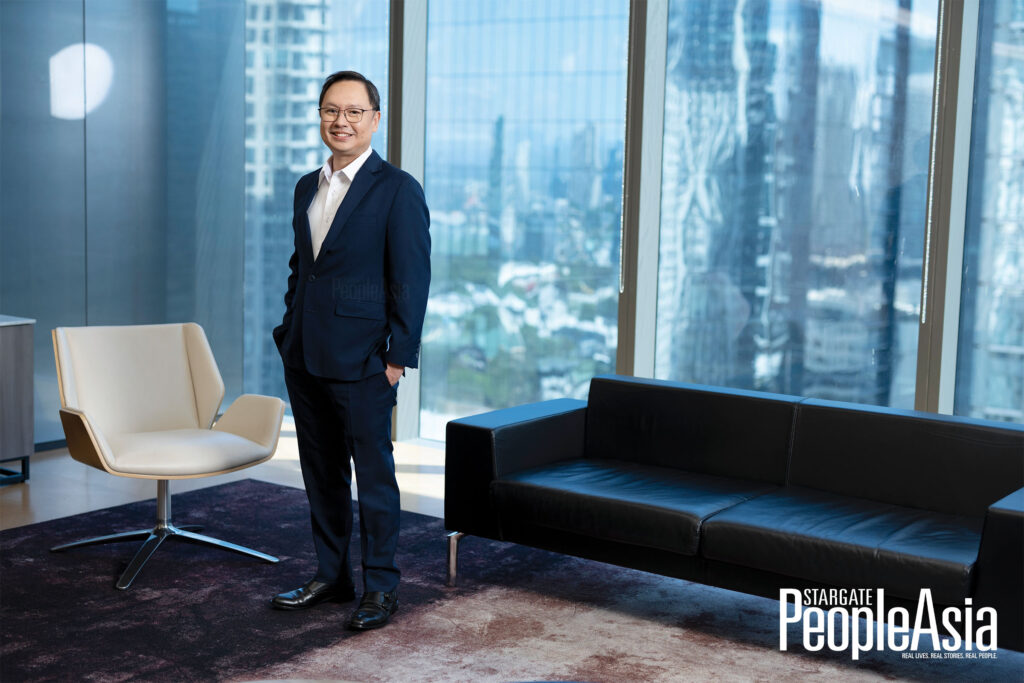The first Filipino CEO of Citi in the Philippines, in over 30 years, is a homegrown Citi talent with 30 years of experience. His dynamic and personable brand of leadership has brought him and his team many international awards, including initiatives that promote financial inclusion.
By FRANCINE Y. MEDINA
Being a Filipino who has been with Citi for the past 30 years places him in a rather unique position. “I always say that I am a CEO in the trenches. I am one who’s ready to roll up my sleeves to be of service where our clients need our expertise. As a homegrown veteran of Citi, I hope I’m able to show my colleagues that through hard work, local talent can rise to the top of a global organization,” Paul Favila shares with PeopleAsia.
Citi’s 122-year presence in the country makes it an institution that has marked its rich legacy in the banking business and likewise in the country’s economic history. Having a Filipino again, finally, as its head, somehow makes Citi’s deep ties with the Philippines come full circle.
Favila joined Citi in 1993 as assistant portfolio manager for Citibank Global Asset Management. Since then, he has held various positions in the company. He is also one of the first trainees of Citi’s Asian Tiger Program in 2004, which allowed him to work in Singapore and Malaysia.
Those were fun and exciting times, he reveals. “I was exposed to the power of the Citi network. Many people I met and worked with during the program are the same people I get to call on for help even today. It was also during this period that I learned to work closely with regulators.
“All throughout, what was constant in my mind was what went well in other countries and what I could bring back. This was a big formative moment in my career. It was also the time when I started developing a vision for the development of the Philippine financial markets.”
Eventually, he returned to Manila. He declares, “I must say, this is also the time I realized that the expatriate life was not for me, and I was happy to grow my wings in my home country.”
Agile leadership
When the pandemic started to rear its ugly head in 2019, Favila and the rest of the management team found themselves facing a new crisis that caused the country to slip into recession. The team and Citibank’s systems, he reveals, were able to face the financial shock head on because they have been prepared for such future emergencies. Fortunately, when the first in a series of lockdowns was announced in March the following year, Citi remained operational the following day.
“In February of 2020, everyone was preparing for split operations and hot sites which was the go-to model for resiliency then. At that time, I was ensuring our teams were prepared to start working from home — leveraging the technology that was already available. Thankfully we were ready.”
Last year, the Philippines surpassed other countries in the region due to its impressive GDP growth of 5.6 percent. In interviews, Amol Gupte, Asia South Cluster and banking head at Citi, asserted that the company is optimistic about the steady growth rate for the Philippines.
Favila echoes this sunny outlook: “We are optimistic about our future in the Philippines and we are poised to continue to grow our businesses, whether in banking, markets or services, by leveraging on our global network. Citi is present in 95 countries and does business in nearly 160 countries and jurisdictions.
Citi in the Philippines serves over 950 multinational companies and over 100 top local corporations. It is also the bank of choice of 90 percent of the top 20 companies in the country by listed market cap. Citi is also the sole settlement bank for dollar transfers for almost 30 years and settles around $5 billion of domestic transfers daily.
“We are optimistic. The right policies are in place, the environment is very constructive and there is genuine interest we are seeing from investors to look into the Philippines. We observed this ourselves when we hosted the delegates of the historic US Presidential Trade and Investments Mission last March and our thought leadership was enthusiastically received. This is not just from the United States but also from the new investment corridors we’ve helped establish in 2023. The future looks bright.”
Favila adds, “I believe that nowadays it is all about leveraging technology, but this space is also evolving very quickly. What is certain is that Citi will continue to remain agile and evolve with the rest of the environment. Being the most global bank, Citi is in the right position to bring the world economy closer together. My vision is to see more Philippine companies grow and venture beyond Philippine shores and that is how I see Citi playing a key role in the decades to come.”
Bigger than himself
At the peak of his game and with a mother lode of experience to run one of the country’s major financial organizations, Favila maintains that there is no slowing down for him at this stage.
His impetus, he says, are these: “First, continue learning. Learning is what drives personal growth.
“Second, delivering impact. I’ve spent a significant part of my career learning from the best and gaining experience. Now is the time and opportunity to influence and deliver. I want to be able to help drive positive change and help bring progress to the Philippines.
“And third, paying things forward. I have been blessed with great mentors. It is my obligation to carry that mentorship forward for the next generation to benefit from. I need to strengthen my shoulders for the next batch to stand on.”
Favila continues: “I work in an industry that has been very removed from the daily lives of the average Filipino. I wish to change that. We cannot have inclusive progress without ensuring financial inclusion. And I will be the first to say that this is a shared advocacy. It is not mine. It is one shared across the industry that I found myself in. We have made progress but there is so much more that needs to happen. This is where I see the power of digitization to make this a reality. It is critical that we are able to provide basic banking services and access to credit to the underserved.”
Closer to home, Favila takes pride in Citi’s partnership with Bangko Sentral ng Pilipinas (BSP) that is the result of Digital Financial Inclusion Awards (DFIA) — an evolution of the 20-year Citi Microentrepreneurship Awards (CMA). The popular program is made possible by the Citi Foundation, in partnership with the Microfinance Council of the Philippines (MCPI) and supported by the BSP. It raises awareness of the importance of micro-entrepreneurship and microfinance in supporting the financial inclusion and economic empowerment of low-income individuals.
DFIA recognizes the country’s most outstanding microfinance institutions (MFIs) and micro-entrepreneurs for their achievements in digital transformation.
Through this program, Favila has met extremely exceptional and hardworking individuals who have succeeded in uplifting their lives through microenterprise and eventually digital finance.
Ripple effect
The ripple effect of the project is compelling, he believes: “Imagine the power of enabling a vast majority of that population to become more productive at the grassroots. Couple that with access to capital and you have a vision of what progress might look like for the Philippines.”
Exciting times are, indeed, ahead for the Citi brand with the decisive, committed and distinctly calm veteran banker rightfully at its helm.
“Simplify,” he reveals his mantra. “I have a saying: ‘Genius is the ability to turn the complicated into simple.’ We, as humans, tend to over complicate things. We should go back to the basics regularly to reset processes and expectations. Only then do we get to see things for what they are. Honestly, I am afraid that the concept of common sense is close to being lost.”
He also says that common sense, patience and curiosity are three essential traits a young banker should develop especially if they aspire to be leaders in their area or on the global stage as well.
Beyond mastering figures, Favila surmises that a successful leader should also be a good manager of people. He adds that developing people is good for the company’s productivity, performance and customer satisfaction. “Bringing out the best in people. The best leader is someone who can identify, inspire and help develop future leaders. This is oftentimes underestimated. There are many good managers and entrepreneurs. That can be learned in school.”
“Leadership is lived,” he says. And as Favila has shown through his exemplary work and advocacy to help uplift less privileged sectors, authentic leadership is indeed alive in him.
Photography by MARK CHESTER ANG
Art Direction by DEXTER FRANCIS DE VERA
Grooming by LARS CABANACAN







